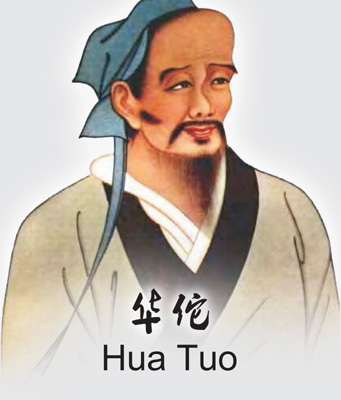
Mafeisan
Hua Tuo's innovative anaesthetic mafeisan "cannabis boiling powder" is a long-standing mystery.The name mafeisan combines ma (cannabis; hemp; numbed"), fei ("boiling; bubbling"), and san ("break up; scatter; medicine in powder form"). Ma can mean "cannabis; hemp" and "numbed; tingling" , which Li believes semantically "derived from the properties of the fruits and leaves, which were used as infusions for medicinal purposes".
Many sinologists and scholars of Traditional Chinese Medicine have guessed at the anaesthetic components of mafei powder. Lu and Needham suggest Hua Tuo may have discovered surgical analgesia byacupuncture, "quite apart from the stupefying potions for which he became so famous – if so he kept it to himself and his immediate disciples so that the secret did not survive".
The governor of Kuang-ling, Li Teng, had an illness which caused him to be distressed by a feeling of stuffiness in his chest. He also had a red face and no desire for food. Hua-t'o took his pulse and said, "Your honor, there are several pints of parasitic bugs in your stomach and you are on the verge of developing an ulcer. This was caused by eating raw fish." Whereupon he prepared two pints of a decoction for the governor, Hua-t'o had him drink one pint first and then after a little while had him finish the remainder. In the space of time that it takes to eat a meal, the governor vomited up three pints or so of parasites. They had red heads and were all wriggling; half of their bodies looked like sashimi. The discomfort that he had experienced was immediately relieved. "This sickness will erupt after three years. If you are attended by a good doctor, he will be able to save you." The sickness did indeed erupt after the specified period. At the time, Hua-t'o was not in the area and the governor died as Hua-t'o had said he would if he did not have a good doctor.



